HSCS 478 Trauma Counselling: Lyndsey's Case Study & CBT
VerifiedAdded on 2023/06/09
|11
|3762
|243
Report
AI Summary
This report addresses trauma counselling for 'Lyndsey,' a patient recently released from the hospital and referred for counselling after experiencing sexual assault. The report begins by advocating for Cognitive Behavioural Therapy (CBT) as an evidence-based approach, detailing its rationale and strengths in addressing Lyndsey's specific trauma, anxiety, and self-harm tendencies. It then critically outlines potential weaknesses of CBT in this case, including risks of increased suicidality, negative feelings, and the time-consuming nature of the therapy. The report further explores how to develop Lyndsey's resilience through realistic planning, coping skills, self-esteem enhancement, and communication skills. Finally, it discusses strategies for the counsellor to minimize the risk of vicarious traumatization while working with Lyndsey, emphasizing the importance of self-care and professional boundaries.

Trauma
Paraphrase This Document
Need a fresh take? Get an instant paraphrase of this document with our AI Paraphraser
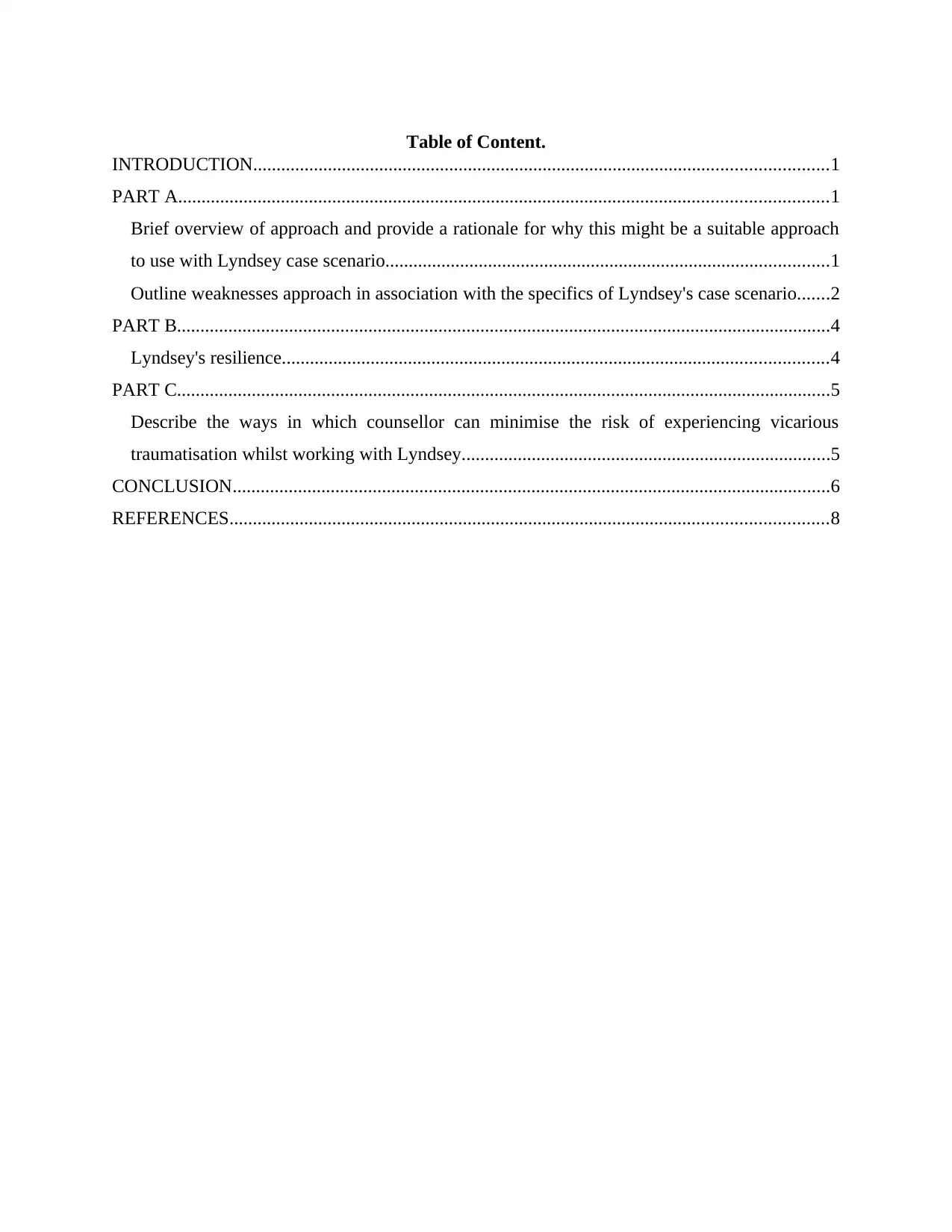
Table of Content.
INTRODUCTION...........................................................................................................................1
PART A...........................................................................................................................................1
Brief overview of approach and provide a rationale for why this might be a suitable approach
to use with Lyndsey case scenario...............................................................................................1
Outline weaknesses approach in association with the specifics of Lyndsey's case scenario.......2
PART B............................................................................................................................................4
Lyndsey's resilience.....................................................................................................................4
PART C............................................................................................................................................5
Describe the ways in which counsellor can minimise the risk of experiencing vicarious
traumatisation whilst working with Lyndsey...............................................................................5
CONCLUSION................................................................................................................................6
REFERENCES................................................................................................................................8
INTRODUCTION...........................................................................................................................1
PART A...........................................................................................................................................1
Brief overview of approach and provide a rationale for why this might be a suitable approach
to use with Lyndsey case scenario...............................................................................................1
Outline weaknesses approach in association with the specifics of Lyndsey's case scenario.......2
PART B............................................................................................................................................4
Lyndsey's resilience.....................................................................................................................4
PART C............................................................................................................................................5
Describe the ways in which counsellor can minimise the risk of experiencing vicarious
traumatisation whilst working with Lyndsey...............................................................................5
CONCLUSION................................................................................................................................6
REFERENCES................................................................................................................................8
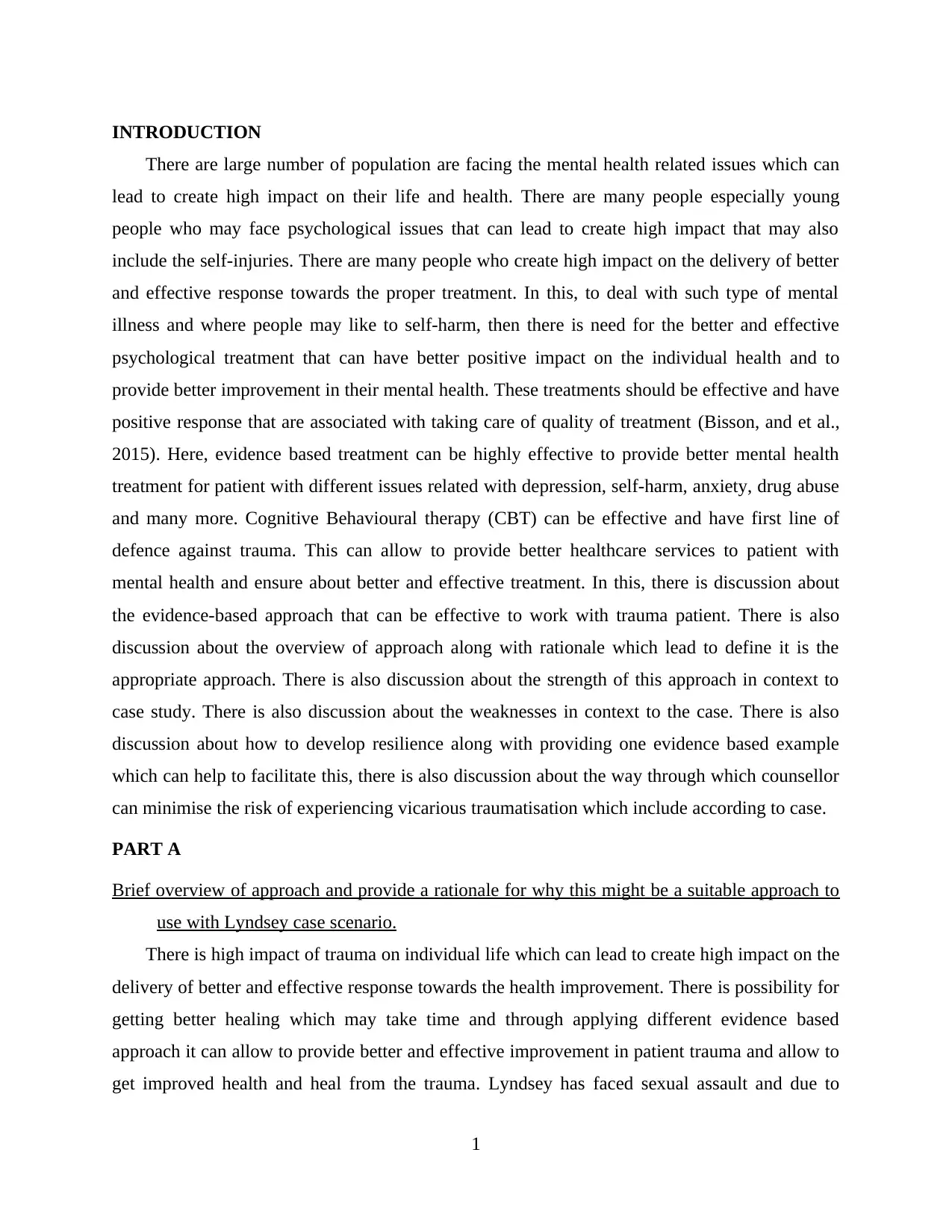
INTRODUCTION
There are large number of population are facing the mental health related issues which can
lead to create high impact on their life and health. There are many people especially young
people who may face psychological issues that can lead to create high impact that may also
include the self-injuries. There are many people who create high impact on the delivery of better
and effective response towards the proper treatment. In this, to deal with such type of mental
illness and where people may like to self-harm, then there is need for the better and effective
psychological treatment that can have better positive impact on the individual health and to
provide better improvement in their mental health. These treatments should be effective and have
positive response that are associated with taking care of quality of treatment (Bisson, and et al.,
2015). Here, evidence based treatment can be highly effective to provide better mental health
treatment for patient with different issues related with depression, self-harm, anxiety, drug abuse
and many more. Cognitive Behavioural therapy (CBT) can be effective and have first line of
defence against trauma. This can allow to provide better healthcare services to patient with
mental health and ensure about better and effective treatment. In this, there is discussion about
the evidence-based approach that can be effective to work with trauma patient. There is also
discussion about the overview of approach along with rationale which lead to define it is the
appropriate approach. There is also discussion about the strength of this approach in context to
case study. There is also discussion about the weaknesses in context to the case. There is also
discussion about how to develop resilience along with providing one evidence based example
which can help to facilitate this, there is also discussion about the way through which counsellor
can minimise the risk of experiencing vicarious traumatisation which include according to case.
PART A
Brief overview of approach and provide a rationale for why this might be a suitable approach to
use with Lyndsey case scenario.
There is high impact of trauma on individual life which can lead to create high impact on the
delivery of better and effective response towards the health improvement. There is possibility for
getting better healing which may take time and through applying different evidence based
approach it can allow to provide better and effective improvement in patient trauma and allow to
get improved health and heal from the trauma. Lyndsey has faced sexual assault and due to
1
There are large number of population are facing the mental health related issues which can
lead to create high impact on their life and health. There are many people especially young
people who may face psychological issues that can lead to create high impact that may also
include the self-injuries. There are many people who create high impact on the delivery of better
and effective response towards the proper treatment. In this, to deal with such type of mental
illness and where people may like to self-harm, then there is need for the better and effective
psychological treatment that can have better positive impact on the individual health and to
provide better improvement in their mental health. These treatments should be effective and have
positive response that are associated with taking care of quality of treatment (Bisson, and et al.,
2015). Here, evidence based treatment can be highly effective to provide better mental health
treatment for patient with different issues related with depression, self-harm, anxiety, drug abuse
and many more. Cognitive Behavioural therapy (CBT) can be effective and have first line of
defence against trauma. This can allow to provide better healthcare services to patient with
mental health and ensure about better and effective treatment. In this, there is discussion about
the evidence-based approach that can be effective to work with trauma patient. There is also
discussion about the overview of approach along with rationale which lead to define it is the
appropriate approach. There is also discussion about the strength of this approach in context to
case study. There is also discussion about the weaknesses in context to the case. There is also
discussion about how to develop resilience along with providing one evidence based example
which can help to facilitate this, there is also discussion about the way through which counsellor
can minimise the risk of experiencing vicarious traumatisation which include according to case.
PART A
Brief overview of approach and provide a rationale for why this might be a suitable approach to
use with Lyndsey case scenario.
There is high impact of trauma on individual life which can lead to create high impact on the
delivery of better and effective response towards the health improvement. There is possibility for
getting better healing which may take time and through applying different evidence based
approach it can allow to provide better and effective improvement in patient trauma and allow to
get improved health and heal from the trauma. Lyndsey has faced sexual assault and due to
1
⊘ This is a preview!⊘
Do you want full access?
Subscribe today to unlock all pages.

Trusted by 1+ million students worldwide
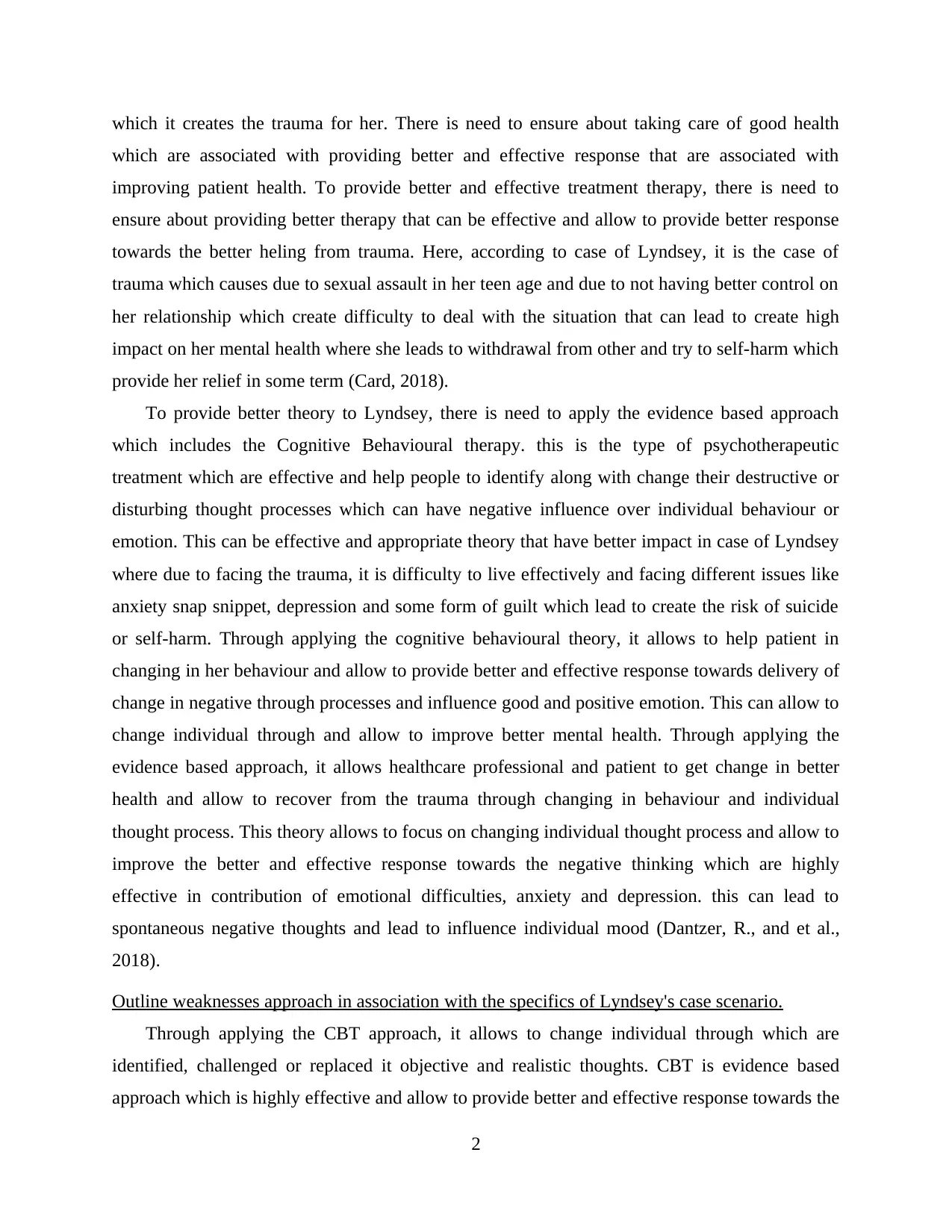
which it creates the trauma for her. There is need to ensure about taking care of good health
which are associated with providing better and effective response that are associated with
improving patient health. To provide better and effective treatment therapy, there is need to
ensure about providing better therapy that can be effective and allow to provide better response
towards the better heling from trauma. Here, according to case of Lyndsey, it is the case of
trauma which causes due to sexual assault in her teen age and due to not having better control on
her relationship which create difficulty to deal with the situation that can lead to create high
impact on her mental health where she leads to withdrawal from other and try to self-harm which
provide her relief in some term (Card, 2018).
To provide better theory to Lyndsey, there is need to apply the evidence based approach
which includes the Cognitive Behavioural therapy. this is the type of psychotherapeutic
treatment which are effective and help people to identify along with change their destructive or
disturbing thought processes which can have negative influence over individual behaviour or
emotion. This can be effective and appropriate theory that have better impact in case of Lyndsey
where due to facing the trauma, it is difficulty to live effectively and facing different issues like
anxiety snap snippet, depression and some form of guilt which lead to create the risk of suicide
or self-harm. Through applying the cognitive behavioural theory, it allows to help patient in
changing in her behaviour and allow to provide better and effective response towards delivery of
change in negative through processes and influence good and positive emotion. This can allow to
change individual through and allow to improve better mental health. Through applying the
evidence based approach, it allows healthcare professional and patient to get change in better
health and allow to recover from the trauma through changing in behaviour and individual
thought process. This theory allows to focus on changing individual thought process and allow to
improve the better and effective response towards the negative thinking which are highly
effective in contribution of emotional difficulties, anxiety and depression. this can lead to
spontaneous negative thoughts and lead to influence individual mood (Dantzer, R., and et al.,
2018).
Outline weaknesses approach in association with the specifics of Lyndsey's case scenario.
Through applying the CBT approach, it allows to change individual through which are
identified, challenged or replaced it objective and realistic thoughts. CBT is evidence based
approach which is highly effective and allow to provide better and effective response towards the
2
which are associated with providing better and effective response that are associated with
improving patient health. To provide better and effective treatment therapy, there is need to
ensure about providing better therapy that can be effective and allow to provide better response
towards the better heling from trauma. Here, according to case of Lyndsey, it is the case of
trauma which causes due to sexual assault in her teen age and due to not having better control on
her relationship which create difficulty to deal with the situation that can lead to create high
impact on her mental health where she leads to withdrawal from other and try to self-harm which
provide her relief in some term (Card, 2018).
To provide better theory to Lyndsey, there is need to apply the evidence based approach
which includes the Cognitive Behavioural therapy. this is the type of psychotherapeutic
treatment which are effective and help people to identify along with change their destructive or
disturbing thought processes which can have negative influence over individual behaviour or
emotion. This can be effective and appropriate theory that have better impact in case of Lyndsey
where due to facing the trauma, it is difficulty to live effectively and facing different issues like
anxiety snap snippet, depression and some form of guilt which lead to create the risk of suicide
or self-harm. Through applying the cognitive behavioural theory, it allows to help patient in
changing in her behaviour and allow to provide better and effective response towards delivery of
change in negative through processes and influence good and positive emotion. This can allow to
change individual through and allow to improve better mental health. Through applying the
evidence based approach, it allows healthcare professional and patient to get change in better
health and allow to recover from the trauma through changing in behaviour and individual
thought process. This theory allows to focus on changing individual thought process and allow to
improve the better and effective response towards the negative thinking which are highly
effective in contribution of emotional difficulties, anxiety and depression. this can lead to
spontaneous negative thoughts and lead to influence individual mood (Dantzer, R., and et al.,
2018).
Outline weaknesses approach in association with the specifics of Lyndsey's case scenario.
Through applying the CBT approach, it allows to change individual through which are
identified, challenged or replaced it objective and realistic thoughts. CBT is evidence based
approach which is highly effective and allow to provide better and effective response towards the
2
Paraphrase This Document
Need a fresh take? Get an instant paraphrase of this document with our AI Paraphraser
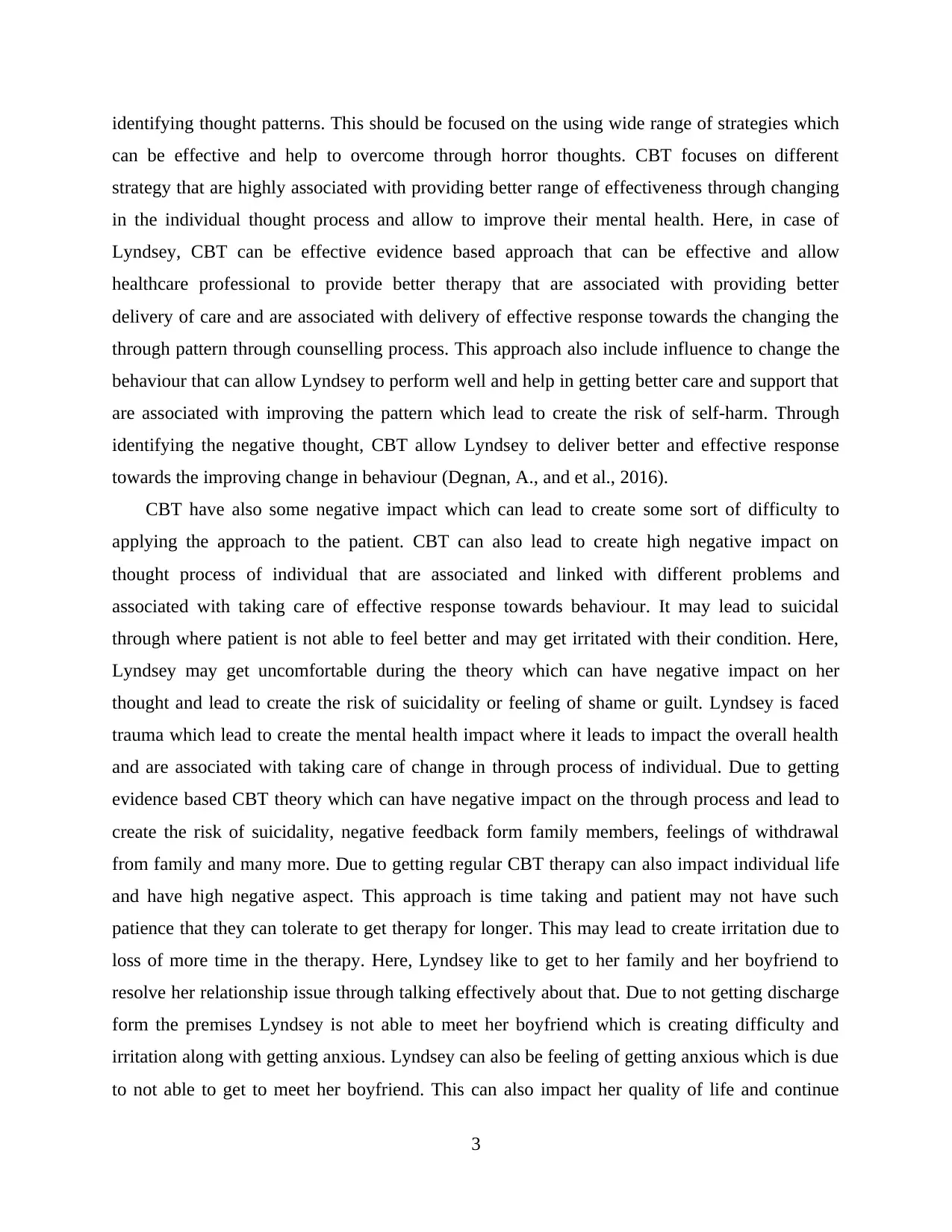
identifying thought patterns. This should be focused on the using wide range of strategies which
can be effective and help to overcome through horror thoughts. CBT focuses on different
strategy that are highly associated with providing better range of effectiveness through changing
in the individual thought process and allow to improve their mental health. Here, in case of
Lyndsey, CBT can be effective evidence based approach that can be effective and allow
healthcare professional to provide better therapy that are associated with providing better
delivery of care and are associated with delivery of effective response towards the changing the
through pattern through counselling process. This approach also include influence to change the
behaviour that can allow Lyndsey to perform well and help in getting better care and support that
are associated with improving the pattern which lead to create the risk of self-harm. Through
identifying the negative thought, CBT allow Lyndsey to deliver better and effective response
towards the improving change in behaviour (Degnan, A., and et al., 2016).
CBT have also some negative impact which can lead to create some sort of difficulty to
applying the approach to the patient. CBT can also lead to create high negative impact on
thought process of individual that are associated and linked with different problems and
associated with taking care of effective response towards behaviour. It may lead to suicidal
through where patient is not able to feel better and may get irritated with their condition. Here,
Lyndsey may get uncomfortable during the theory which can have negative impact on her
thought and lead to create the risk of suicidality or feeling of shame or guilt. Lyndsey is faced
trauma which lead to create the mental health impact where it leads to impact the overall health
and are associated with taking care of change in through process of individual. Due to getting
evidence based CBT theory which can have negative impact on the through process and lead to
create the risk of suicidality, negative feedback form family members, feelings of withdrawal
from family and many more. Due to getting regular CBT therapy can also impact individual life
and have high negative aspect. This approach is time taking and patient may not have such
patience that they can tolerate to get therapy for longer. This may lead to create irritation due to
loss of more time in the therapy. Here, Lyndsey like to get to her family and her boyfriend to
resolve her relationship issue through talking effectively about that. Due to not getting discharge
form the premises Lyndsey is not able to meet her boyfriend which is creating difficulty and
irritation along with getting anxious. Lyndsey can also be feeling of getting anxious which is due
to not able to get to meet her boyfriend. This can also impact her quality of life and continue
3
can be effective and help to overcome through horror thoughts. CBT focuses on different
strategy that are highly associated with providing better range of effectiveness through changing
in the individual thought process and allow to improve their mental health. Here, in case of
Lyndsey, CBT can be effective evidence based approach that can be effective and allow
healthcare professional to provide better therapy that are associated with providing better
delivery of care and are associated with delivery of effective response towards the changing the
through pattern through counselling process. This approach also include influence to change the
behaviour that can allow Lyndsey to perform well and help in getting better care and support that
are associated with improving the pattern which lead to create the risk of self-harm. Through
identifying the negative thought, CBT allow Lyndsey to deliver better and effective response
towards the improving change in behaviour (Degnan, A., and et al., 2016).
CBT have also some negative impact which can lead to create some sort of difficulty to
applying the approach to the patient. CBT can also lead to create high negative impact on
thought process of individual that are associated and linked with different problems and
associated with taking care of effective response towards behaviour. It may lead to suicidal
through where patient is not able to feel better and may get irritated with their condition. Here,
Lyndsey may get uncomfortable during the theory which can have negative impact on her
thought and lead to create the risk of suicidality or feeling of shame or guilt. Lyndsey is faced
trauma which lead to create the mental health impact where it leads to impact the overall health
and are associated with taking care of change in through process of individual. Due to getting
evidence based CBT theory which can have negative impact on the through process and lead to
create the risk of suicidality, negative feedback form family members, feelings of withdrawal
from family and many more. Due to getting regular CBT therapy can also impact individual life
and have high negative aspect. This approach is time taking and patient may not have such
patience that they can tolerate to get therapy for longer. This may lead to create irritation due to
loss of more time in the therapy. Here, Lyndsey like to get to her family and her boyfriend to
resolve her relationship issue through talking effectively about that. Due to not getting discharge
form the premises Lyndsey is not able to meet her boyfriend which is creating difficulty and
irritation along with getting anxious. Lyndsey can also be feeling of getting anxious which is due
to not able to get to meet her boyfriend. This can also impact her quality of life and continue
3
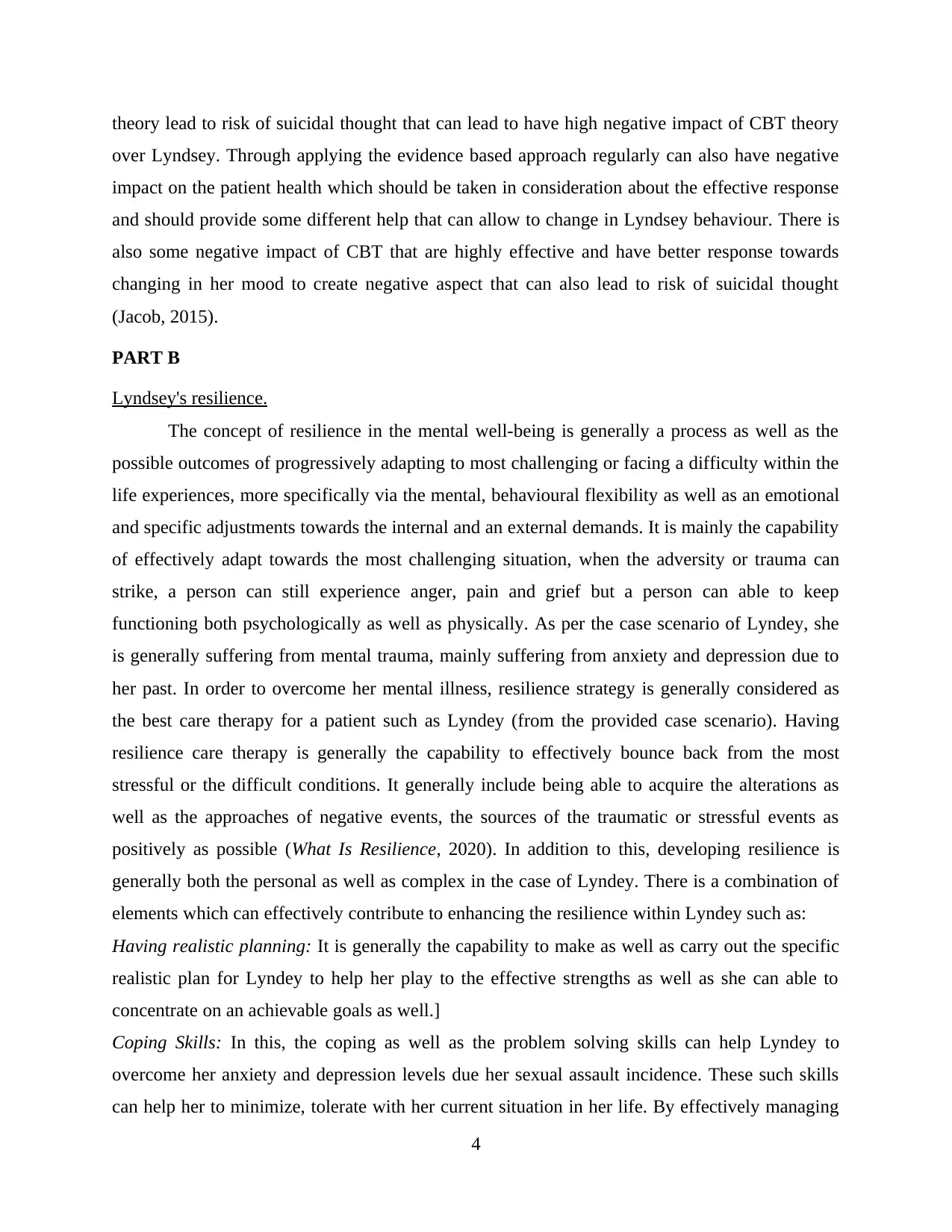
theory lead to risk of suicidal thought that can lead to have high negative impact of CBT theory
over Lyndsey. Through applying the evidence based approach regularly can also have negative
impact on the patient health which should be taken in consideration about the effective response
and should provide some different help that can allow to change in Lyndsey behaviour. There is
also some negative impact of CBT that are highly effective and have better response towards
changing in her mood to create negative aspect that can also lead to risk of suicidal thought
(Jacob, 2015).
PART B
Lyndsey's resilience.
The concept of resilience in the mental well-being is generally a process as well as the
possible outcomes of progressively adapting to most challenging or facing a difficulty within the
life experiences, more specifically via the mental, behavioural flexibility as well as an emotional
and specific adjustments towards the internal and an external demands. It is mainly the capability
of effectively adapt towards the most challenging situation, when the adversity or trauma can
strike, a person can still experience anger, pain and grief but a person can able to keep
functioning both psychologically as well as physically. As per the case scenario of Lyndey, she
is generally suffering from mental trauma, mainly suffering from anxiety and depression due to
her past. In order to overcome her mental illness, resilience strategy is generally considered as
the best care therapy for a patient such as Lyndey (from the provided case scenario). Having
resilience care therapy is generally the capability to effectively bounce back from the most
stressful or the difficult conditions. It generally include being able to acquire the alterations as
well as the approaches of negative events, the sources of the traumatic or stressful events as
positively as possible (What Is Resilience, 2020). In addition to this, developing resilience is
generally both the personal as well as complex in the case of Lyndey. There is a combination of
elements which can effectively contribute to enhancing the resilience within Lyndey such as:
Having realistic planning: It is generally the capability to make as well as carry out the specific
realistic plan for Lyndey to help her play to the effective strengths as well as she can able to
concentrate on an achievable goals as well.]
Coping Skills: In this, the coping as well as the problem solving skills can help Lyndey to
overcome her anxiety and depression levels due her sexual assault incidence. These such skills
can help her to minimize, tolerate with her current situation in her life. By effectively managing
4
over Lyndsey. Through applying the evidence based approach regularly can also have negative
impact on the patient health which should be taken in consideration about the effective response
and should provide some different help that can allow to change in Lyndsey behaviour. There is
also some negative impact of CBT that are highly effective and have better response towards
changing in her mood to create negative aspect that can also lead to risk of suicidal thought
(Jacob, 2015).
PART B
Lyndsey's resilience.
The concept of resilience in the mental well-being is generally a process as well as the
possible outcomes of progressively adapting to most challenging or facing a difficulty within the
life experiences, more specifically via the mental, behavioural flexibility as well as an emotional
and specific adjustments towards the internal and an external demands. It is mainly the capability
of effectively adapt towards the most challenging situation, when the adversity or trauma can
strike, a person can still experience anger, pain and grief but a person can able to keep
functioning both psychologically as well as physically. As per the case scenario of Lyndey, she
is generally suffering from mental trauma, mainly suffering from anxiety and depression due to
her past. In order to overcome her mental illness, resilience strategy is generally considered as
the best care therapy for a patient such as Lyndey (from the provided case scenario). Having
resilience care therapy is generally the capability to effectively bounce back from the most
stressful or the difficult conditions. It generally include being able to acquire the alterations as
well as the approaches of negative events, the sources of the traumatic or stressful events as
positively as possible (What Is Resilience, 2020). In addition to this, developing resilience is
generally both the personal as well as complex in the case of Lyndey. There is a combination of
elements which can effectively contribute to enhancing the resilience within Lyndey such as:
Having realistic planning: It is generally the capability to make as well as carry out the specific
realistic plan for Lyndey to help her play to the effective strengths as well as she can able to
concentrate on an achievable goals as well.]
Coping Skills: In this, the coping as well as the problem solving skills can help Lyndey to
overcome her anxiety and depression levels due her sexual assault incidence. These such skills
can help her to minimize, tolerate with her current situation in her life. By effectively managing
4
⊘ This is a preview!⊘
Do you want full access?
Subscribe today to unlock all pages.

Trusted by 1+ million students worldwide
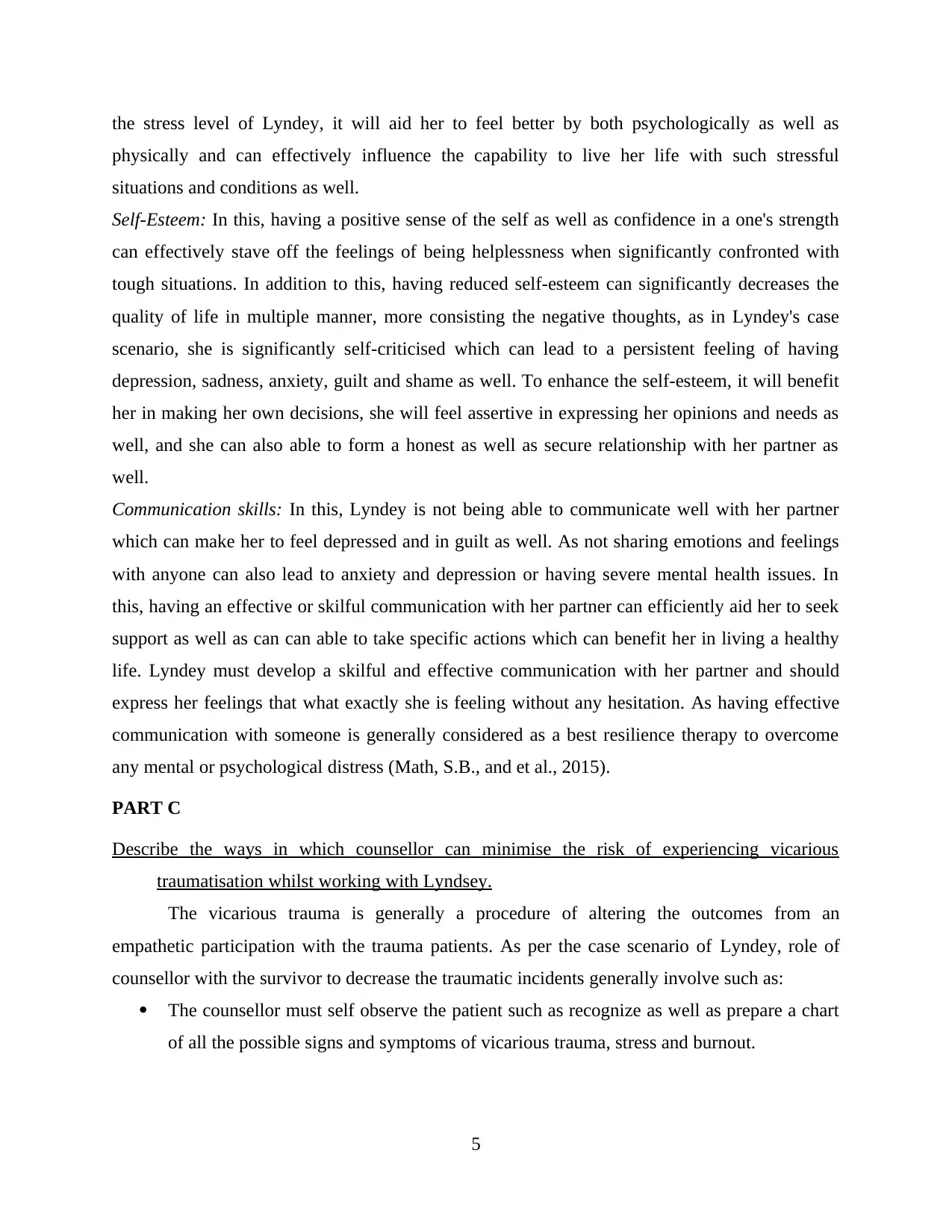
the stress level of Lyndey, it will aid her to feel better by both psychologically as well as
physically and can effectively influence the capability to live her life with such stressful
situations and conditions as well.
Self-Esteem: In this, having a positive sense of the self as well as confidence in a one's strength
can effectively stave off the feelings of being helplessness when significantly confronted with
tough situations. In addition to this, having reduced self-esteem can significantly decreases the
quality of life in multiple manner, more consisting the negative thoughts, as in Lyndey's case
scenario, she is significantly self-criticised which can lead to a persistent feeling of having
depression, sadness, anxiety, guilt and shame as well. To enhance the self-esteem, it will benefit
her in making her own decisions, she will feel assertive in expressing her opinions and needs as
well, and she can also able to form a honest as well as secure relationship with her partner as
well.
Communication skills: In this, Lyndey is not being able to communicate well with her partner
which can make her to feel depressed and in guilt as well. As not sharing emotions and feelings
with anyone can also lead to anxiety and depression or having severe mental health issues. In
this, having an effective or skilful communication with her partner can efficiently aid her to seek
support as well as can can able to take specific actions which can benefit her in living a healthy
life. Lyndey must develop a skilful and effective communication with her partner and should
express her feelings that what exactly she is feeling without any hesitation. As having effective
communication with someone is generally considered as a best resilience therapy to overcome
any mental or psychological distress (Math, S.B., and et al., 2015).
PART C
Describe the ways in which counsellor can minimise the risk of experiencing vicarious
traumatisation whilst working with Lyndsey.
The vicarious trauma is generally a procedure of altering the outcomes from an
empathetic participation with the trauma patients. As per the case scenario of Lyndey, role of
counsellor with the survivor to decrease the traumatic incidents generally involve such as:
The counsellor must self observe the patient such as recognize as well as prepare a chart
of all the possible signs and symptoms of vicarious trauma, stress and burnout.
5
physically and can effectively influence the capability to live her life with such stressful
situations and conditions as well.
Self-Esteem: In this, having a positive sense of the self as well as confidence in a one's strength
can effectively stave off the feelings of being helplessness when significantly confronted with
tough situations. In addition to this, having reduced self-esteem can significantly decreases the
quality of life in multiple manner, more consisting the negative thoughts, as in Lyndey's case
scenario, she is significantly self-criticised which can lead to a persistent feeling of having
depression, sadness, anxiety, guilt and shame as well. To enhance the self-esteem, it will benefit
her in making her own decisions, she will feel assertive in expressing her opinions and needs as
well, and she can also able to form a honest as well as secure relationship with her partner as
well.
Communication skills: In this, Lyndey is not being able to communicate well with her partner
which can make her to feel depressed and in guilt as well. As not sharing emotions and feelings
with anyone can also lead to anxiety and depression or having severe mental health issues. In
this, having an effective or skilful communication with her partner can efficiently aid her to seek
support as well as can can able to take specific actions which can benefit her in living a healthy
life. Lyndey must develop a skilful and effective communication with her partner and should
express her feelings that what exactly she is feeling without any hesitation. As having effective
communication with someone is generally considered as a best resilience therapy to overcome
any mental or psychological distress (Math, S.B., and et al., 2015).
PART C
Describe the ways in which counsellor can minimise the risk of experiencing vicarious
traumatisation whilst working with Lyndsey.
The vicarious trauma is generally a procedure of altering the outcomes from an
empathetic participation with the trauma patients. As per the case scenario of Lyndey, role of
counsellor with the survivor to decrease the traumatic incidents generally involve such as:
The counsellor must self observe the patient such as recognize as well as prepare a chart
of all the possible signs and symptoms of vicarious trauma, stress and burnout.
5
Paraphrase This Document
Need a fresh take? Get an instant paraphrase of this document with our AI Paraphraser
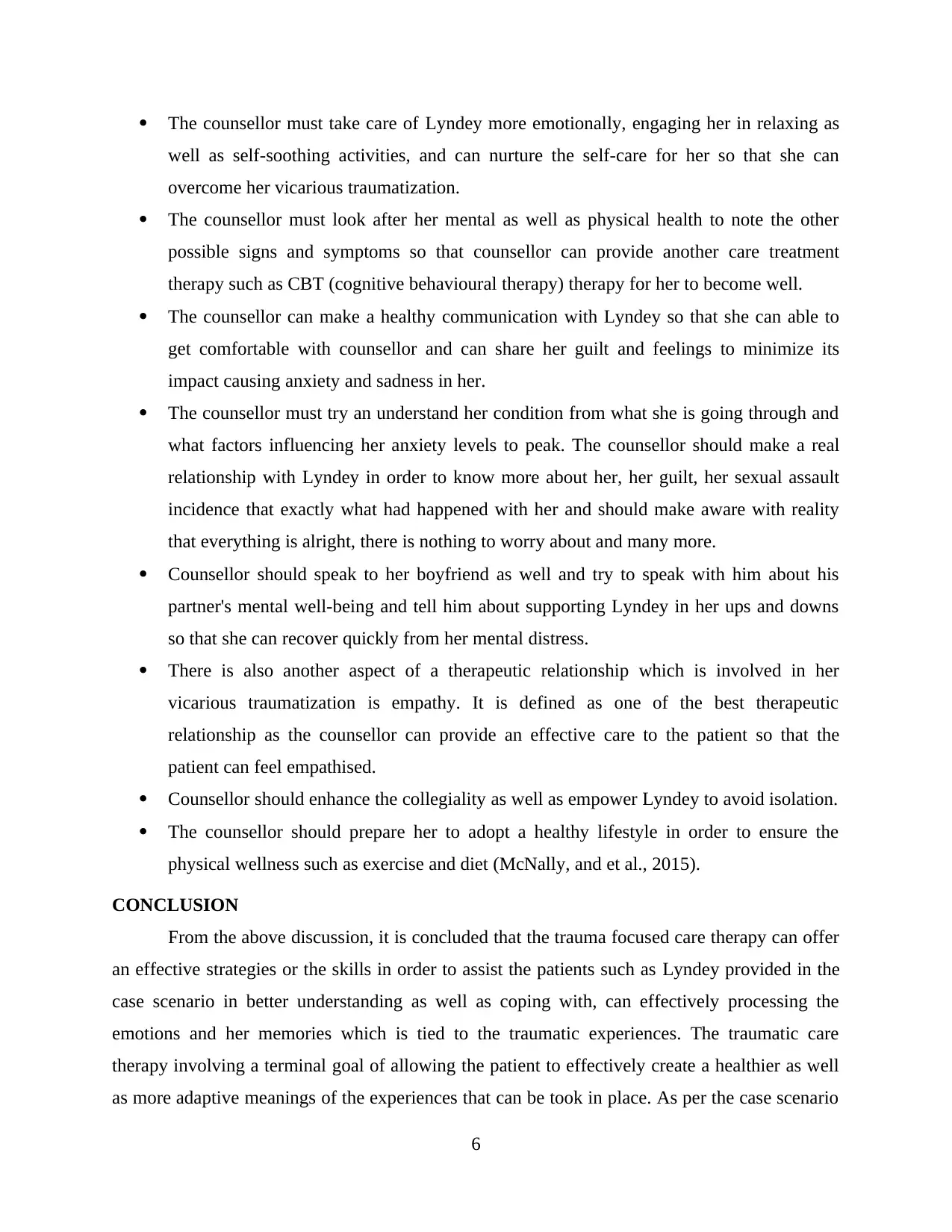
The counsellor must take care of Lyndey more emotionally, engaging her in relaxing as
well as self-soothing activities, and can nurture the self-care for her so that she can
overcome her vicarious traumatization.
The counsellor must look after her mental as well as physical health to note the other
possible signs and symptoms so that counsellor can provide another care treatment
therapy such as CBT (cognitive behavioural therapy) therapy for her to become well.
The counsellor can make a healthy communication with Lyndey so that she can able to
get comfortable with counsellor and can share her guilt and feelings to minimize its
impact causing anxiety and sadness in her.
The counsellor must try an understand her condition from what she is going through and
what factors influencing her anxiety levels to peak. The counsellor should make a real
relationship with Lyndey in order to know more about her, her guilt, her sexual assault
incidence that exactly what had happened with her and should make aware with reality
that everything is alright, there is nothing to worry about and many more.
Counsellor should speak to her boyfriend as well and try to speak with him about his
partner's mental well-being and tell him about supporting Lyndey in her ups and downs
so that she can recover quickly from her mental distress.
There is also another aspect of a therapeutic relationship which is involved in her
vicarious traumatization is empathy. It is defined as one of the best therapeutic
relationship as the counsellor can provide an effective care to the patient so that the
patient can feel empathised.
Counsellor should enhance the collegiality as well as empower Lyndey to avoid isolation.
The counsellor should prepare her to adopt a healthy lifestyle in order to ensure the
physical wellness such as exercise and diet (McNally, and et al., 2015).
CONCLUSION
From the above discussion, it is concluded that the trauma focused care therapy can offer
an effective strategies or the skills in order to assist the patients such as Lyndey provided in the
case scenario in better understanding as well as coping with, can effectively processing the
emotions and her memories which is tied to the traumatic experiences. The traumatic care
therapy involving a terminal goal of allowing the patient to effectively create a healthier as well
as more adaptive meanings of the experiences that can be took in place. As per the case scenario
6
well as self-soothing activities, and can nurture the self-care for her so that she can
overcome her vicarious traumatization.
The counsellor must look after her mental as well as physical health to note the other
possible signs and symptoms so that counsellor can provide another care treatment
therapy such as CBT (cognitive behavioural therapy) therapy for her to become well.
The counsellor can make a healthy communication with Lyndey so that she can able to
get comfortable with counsellor and can share her guilt and feelings to minimize its
impact causing anxiety and sadness in her.
The counsellor must try an understand her condition from what she is going through and
what factors influencing her anxiety levels to peak. The counsellor should make a real
relationship with Lyndey in order to know more about her, her guilt, her sexual assault
incidence that exactly what had happened with her and should make aware with reality
that everything is alright, there is nothing to worry about and many more.
Counsellor should speak to her boyfriend as well and try to speak with him about his
partner's mental well-being and tell him about supporting Lyndey in her ups and downs
so that she can recover quickly from her mental distress.
There is also another aspect of a therapeutic relationship which is involved in her
vicarious traumatization is empathy. It is defined as one of the best therapeutic
relationship as the counsellor can provide an effective care to the patient so that the
patient can feel empathised.
Counsellor should enhance the collegiality as well as empower Lyndey to avoid isolation.
The counsellor should prepare her to adopt a healthy lifestyle in order to ensure the
physical wellness such as exercise and diet (McNally, and et al., 2015).
CONCLUSION
From the above discussion, it is concluded that the trauma focused care therapy can offer
an effective strategies or the skills in order to assist the patients such as Lyndey provided in the
case scenario in better understanding as well as coping with, can effectively processing the
emotions and her memories which is tied to the traumatic experiences. The traumatic care
therapy involving a terminal goal of allowing the patient to effectively create a healthier as well
as more adaptive meanings of the experiences that can be took in place. As per the case scenario
6
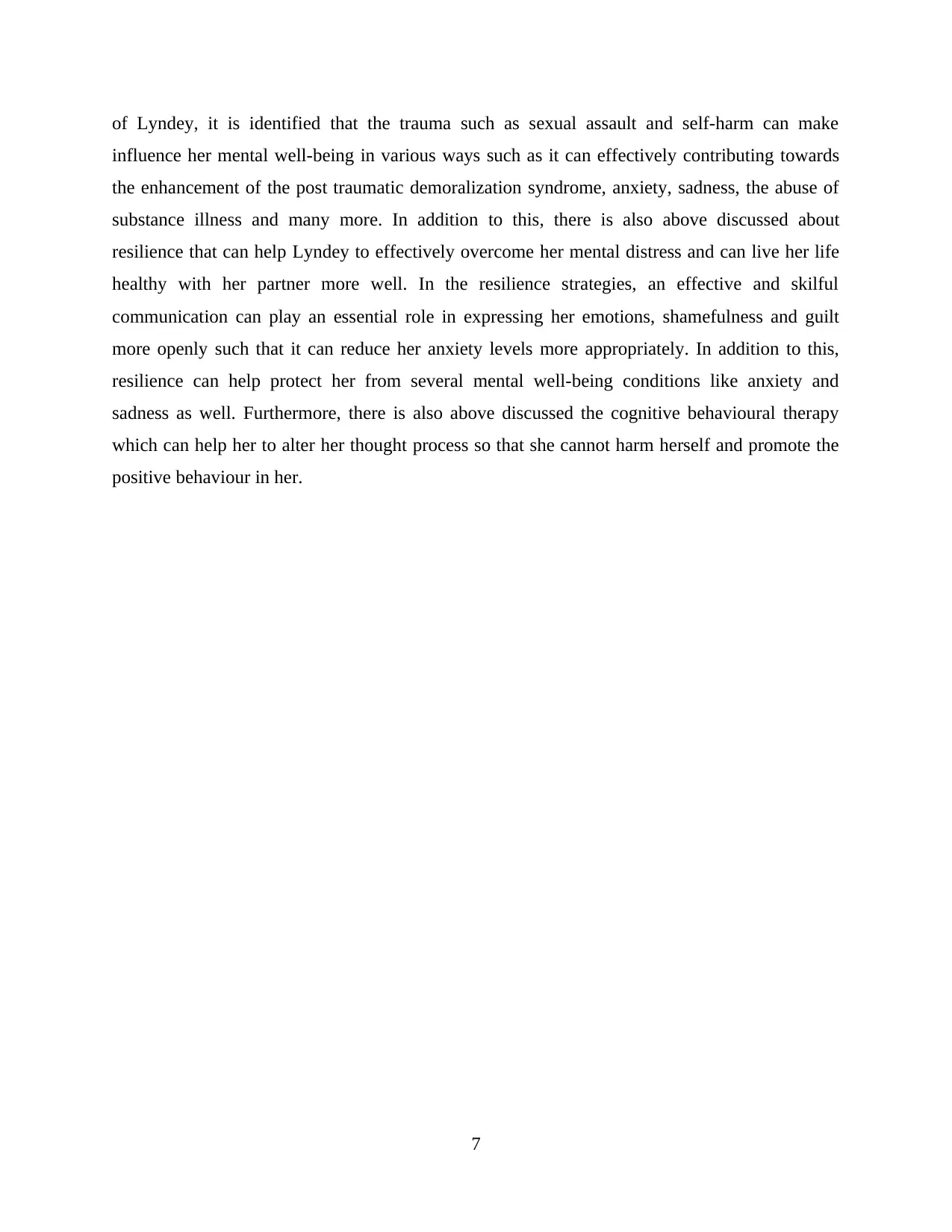
of Lyndey, it is identified that the trauma such as sexual assault and self-harm can make
influence her mental well-being in various ways such as it can effectively contributing towards
the enhancement of the post traumatic demoralization syndrome, anxiety, sadness, the abuse of
substance illness and many more. In addition to this, there is also above discussed about
resilience that can help Lyndey to effectively overcome her mental distress and can live her life
healthy with her partner more well. In the resilience strategies, an effective and skilful
communication can play an essential role in expressing her emotions, shamefulness and guilt
more openly such that it can reduce her anxiety levels more appropriately. In addition to this,
resilience can help protect her from several mental well-being conditions like anxiety and
sadness as well. Furthermore, there is also above discussed the cognitive behavioural therapy
which can help her to alter her thought process so that she cannot harm herself and promote the
positive behaviour in her.
7
influence her mental well-being in various ways such as it can effectively contributing towards
the enhancement of the post traumatic demoralization syndrome, anxiety, sadness, the abuse of
substance illness and many more. In addition to this, there is also above discussed about
resilience that can help Lyndey to effectively overcome her mental distress and can live her life
healthy with her partner more well. In the resilience strategies, an effective and skilful
communication can play an essential role in expressing her emotions, shamefulness and guilt
more openly such that it can reduce her anxiety levels more appropriately. In addition to this,
resilience can help protect her from several mental well-being conditions like anxiety and
sadness as well. Furthermore, there is also above discussed the cognitive behavioural therapy
which can help her to alter her thought process so that she cannot harm herself and promote the
positive behaviour in her.
7
⊘ This is a preview!⊘
Do you want full access?
Subscribe today to unlock all pages.

Trusted by 1+ million students worldwide
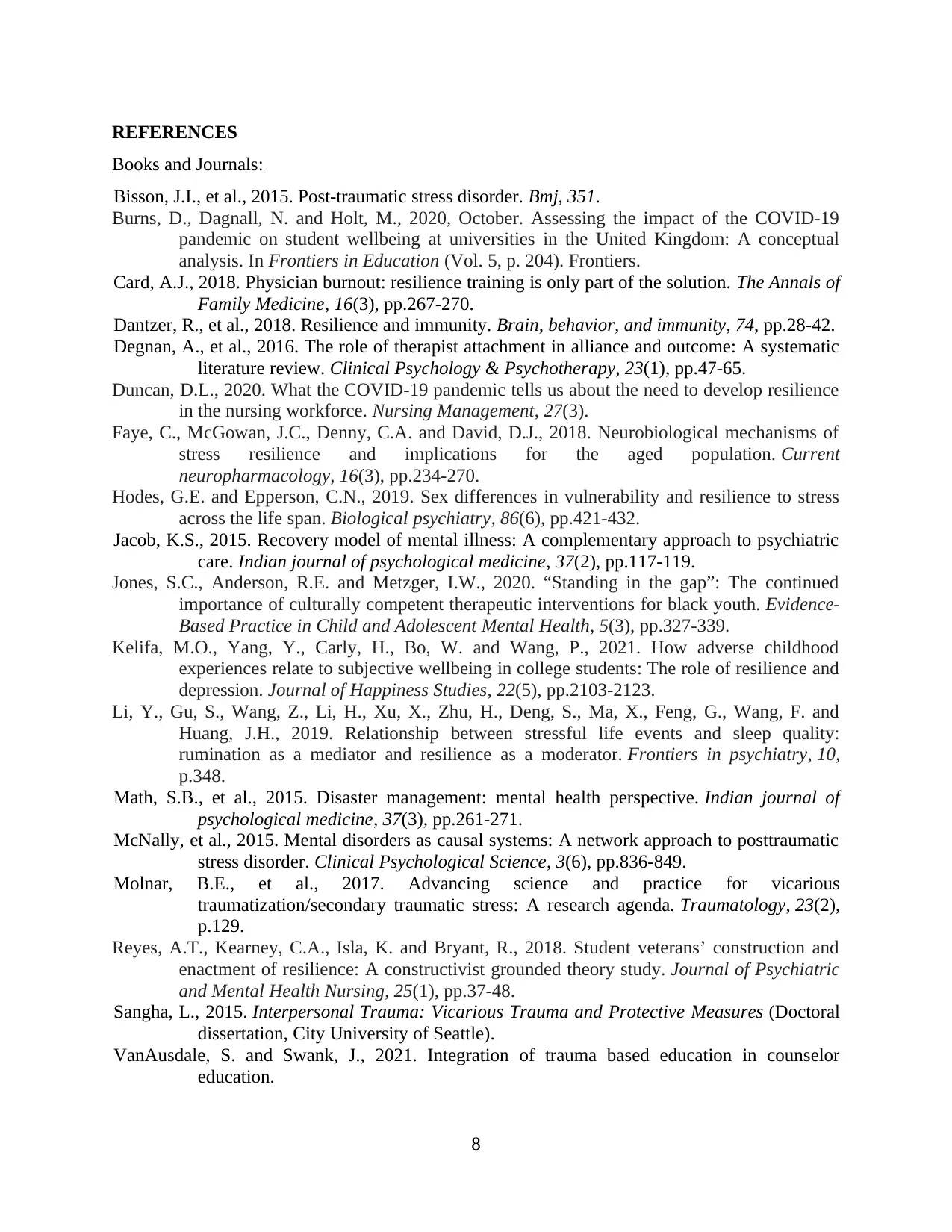
REFERENCES
Books and Journals:
Bisson, J.I., et al., 2015. Post-traumatic stress disorder. Bmj, 351.
Burns, D., Dagnall, N. and Holt, M., 2020, October. Assessing the impact of the COVID-19
pandemic on student wellbeing at universities in the United Kingdom: A conceptual
analysis. In Frontiers in Education (Vol. 5, p. 204). Frontiers.
Card, A.J., 2018. Physician burnout: resilience training is only part of the solution. The Annals of
Family Medicine, 16(3), pp.267-270.
Dantzer, R., et al., 2018. Resilience and immunity. Brain, behavior, and immunity, 74, pp.28-42.
Degnan, A., et al., 2016. The role of therapist attachment in alliance and outcome: A systematic
literature review. Clinical Psychology & Psychotherapy, 23(1), pp.47-65.
Duncan, D.L., 2020. What the COVID-19 pandemic tells us about the need to develop resilience
in the nursing workforce. Nursing Management, 27(3).
Faye, C., McGowan, J.C., Denny, C.A. and David, D.J., 2018. Neurobiological mechanisms of
stress resilience and implications for the aged population. Current
neuropharmacology, 16(3), pp.234-270.
Hodes, G.E. and Epperson, C.N., 2019. Sex differences in vulnerability and resilience to stress
across the life span. Biological psychiatry, 86(6), pp.421-432.
Jacob, K.S., 2015. Recovery model of mental illness: A complementary approach to psychiatric
care. Indian journal of psychological medicine, 37(2), pp.117-119.
Jones, S.C., Anderson, R.E. and Metzger, I.W., 2020. “Standing in the gap”: The continued
importance of culturally competent therapeutic interventions for black youth. Evidence-
Based Practice in Child and Adolescent Mental Health, 5(3), pp.327-339.
Kelifa, M.O., Yang, Y., Carly, H., Bo, W. and Wang, P., 2021. How adverse childhood
experiences relate to subjective wellbeing in college students: The role of resilience and
depression. Journal of Happiness Studies, 22(5), pp.2103-2123.
Li, Y., Gu, S., Wang, Z., Li, H., Xu, X., Zhu, H., Deng, S., Ma, X., Feng, G., Wang, F. and
Huang, J.H., 2019. Relationship between stressful life events and sleep quality:
rumination as a mediator and resilience as a moderator. Frontiers in psychiatry, 10,
p.348.
Math, S.B., et al., 2015. Disaster management: mental health perspective. Indian journal of
psychological medicine, 37(3), pp.261-271.
McNally, et al., 2015. Mental disorders as causal systems: A network approach to posttraumatic
stress disorder. Clinical Psychological Science, 3(6), pp.836-849.
Molnar, B.E., et al., 2017. Advancing science and practice for vicarious
traumatization/secondary traumatic stress: A research agenda. Traumatology, 23(2),
p.129.
Reyes, A.T., Kearney, C.A., Isla, K. and Bryant, R., 2018. Student veterans’ construction and
enactment of resilience: A constructivist grounded theory study. Journal of Psychiatric
and Mental Health Nursing, 25(1), pp.37-48.
Sangha, L., 2015. Interpersonal Trauma: Vicarious Trauma and Protective Measures (Doctoral
dissertation, City University of Seattle).
VanAusdale, S. and Swank, J., 2021. Integration of trauma based education in counselor
education.
8
Books and Journals:
Bisson, J.I., et al., 2015. Post-traumatic stress disorder. Bmj, 351.
Burns, D., Dagnall, N. and Holt, M., 2020, October. Assessing the impact of the COVID-19
pandemic on student wellbeing at universities in the United Kingdom: A conceptual
analysis. In Frontiers in Education (Vol. 5, p. 204). Frontiers.
Card, A.J., 2018. Physician burnout: resilience training is only part of the solution. The Annals of
Family Medicine, 16(3), pp.267-270.
Dantzer, R., et al., 2018. Resilience and immunity. Brain, behavior, and immunity, 74, pp.28-42.
Degnan, A., et al., 2016. The role of therapist attachment in alliance and outcome: A systematic
literature review. Clinical Psychology & Psychotherapy, 23(1), pp.47-65.
Duncan, D.L., 2020. What the COVID-19 pandemic tells us about the need to develop resilience
in the nursing workforce. Nursing Management, 27(3).
Faye, C., McGowan, J.C., Denny, C.A. and David, D.J., 2018. Neurobiological mechanisms of
stress resilience and implications for the aged population. Current
neuropharmacology, 16(3), pp.234-270.
Hodes, G.E. and Epperson, C.N., 2019. Sex differences in vulnerability and resilience to stress
across the life span. Biological psychiatry, 86(6), pp.421-432.
Jacob, K.S., 2015. Recovery model of mental illness: A complementary approach to psychiatric
care. Indian journal of psychological medicine, 37(2), pp.117-119.
Jones, S.C., Anderson, R.E. and Metzger, I.W., 2020. “Standing in the gap”: The continued
importance of culturally competent therapeutic interventions for black youth. Evidence-
Based Practice in Child and Adolescent Mental Health, 5(3), pp.327-339.
Kelifa, M.O., Yang, Y., Carly, H., Bo, W. and Wang, P., 2021. How adverse childhood
experiences relate to subjective wellbeing in college students: The role of resilience and
depression. Journal of Happiness Studies, 22(5), pp.2103-2123.
Li, Y., Gu, S., Wang, Z., Li, H., Xu, X., Zhu, H., Deng, S., Ma, X., Feng, G., Wang, F. and
Huang, J.H., 2019. Relationship between stressful life events and sleep quality:
rumination as a mediator and resilience as a moderator. Frontiers in psychiatry, 10,
p.348.
Math, S.B., et al., 2015. Disaster management: mental health perspective. Indian journal of
psychological medicine, 37(3), pp.261-271.
McNally, et al., 2015. Mental disorders as causal systems: A network approach to posttraumatic
stress disorder. Clinical Psychological Science, 3(6), pp.836-849.
Molnar, B.E., et al., 2017. Advancing science and practice for vicarious
traumatization/secondary traumatic stress: A research agenda. Traumatology, 23(2),
p.129.
Reyes, A.T., Kearney, C.A., Isla, K. and Bryant, R., 2018. Student veterans’ construction and
enactment of resilience: A constructivist grounded theory study. Journal of Psychiatric
and Mental Health Nursing, 25(1), pp.37-48.
Sangha, L., 2015. Interpersonal Trauma: Vicarious Trauma and Protective Measures (Doctoral
dissertation, City University of Seattle).
VanAusdale, S. and Swank, J., 2021. Integration of trauma based education in counselor
education.
8
Paraphrase This Document
Need a fresh take? Get an instant paraphrase of this document with our AI Paraphraser
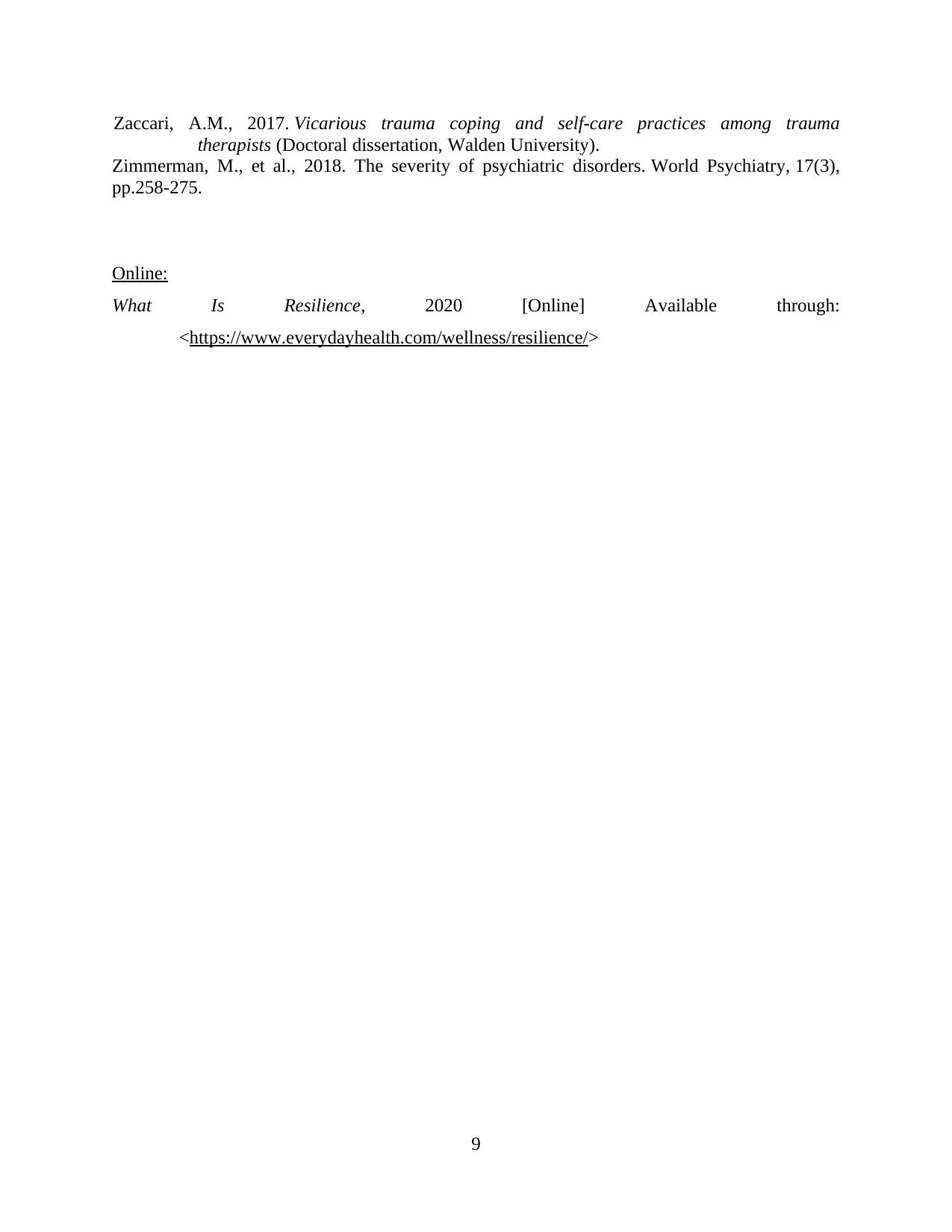
Zaccari, A.M., 2017. Vicarious trauma coping and self-care practices among trauma
therapists (Doctoral dissertation, Walden University).
Zimmerman, M., et al., 2018. The severity of psychiatric disorders. World Psychiatry, 17(3),
pp.258-275.
Online:
What Is Resilience, 2020 [Online] Available through:
<https://www.everydayhealth.com/wellness/resilience/>
9
therapists (Doctoral dissertation, Walden University).
Zimmerman, M., et al., 2018. The severity of psychiatric disorders. World Psychiatry, 17(3),
pp.258-275.
Online:
What Is Resilience, 2020 [Online] Available through:
<https://www.everydayhealth.com/wellness/resilience/>
9
1 out of 11
Related Documents
Your All-in-One AI-Powered Toolkit for Academic Success.
+13062052269
info@desklib.com
Available 24*7 on WhatsApp / Email
![[object Object]](/_next/static/media/star-bottom.7253800d.svg)
Unlock your academic potential
Copyright © 2020–2025 A2Z Services. All Rights Reserved. Developed and managed by ZUCOL.





